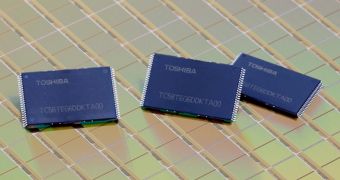While Samsung is releasing new solid-state drives, Toshiba is preparing semiconductors that will be used in its own next generation of storage devices. Which is to say, a new NAND memory chip has been invented.
Just like there is more than one way to skin a goat, there is more than one way to make a solid-state drive.
It all depends on the target consumer base and the available components, as well as company marketing plans.
In this instance, Toshiba wishes to create new and better solid-state drives for PCs (desktops and laptops), memory cards for consumer electronics, embedded flash memory, tablet storage, even enterprise solutions.
Since performance and capacities depend quite a bit on the type of chips used, Toshiba figured it was time it started mass production of a new generation.
That is what led to the second-generation 19nm process technology, which will be utilized for making 2-bit-per-cell 64 Gigabit NAND memory chips.
They will be the smallest 2-bit per-cell 64 gigabit NAND memory chips, with an area of only 94 square millimeters.
A high-speed writing method achieves up to 25 megabytes per second, the fastest in 2-bit-per-cell chips.
In addition to 2-bit-per-cell chips, Toshiba is putting together, or is developing a technique, for 3-bit-per-cell chips. Mass production will only start in the second quarter of the current fiscal year though (FY2014), which is few months from now.
All that is left is to develop a controller compatible with eMMC and there will be a new option for smartphone and tablet storage.
We do not know what performance the 3 bpc chips will possess. Toshiba isn't exactly far enough along in development and manufacturing to have that information, yet. We'll have to wait and see what kinds of SSDs/memory cards debut over the next few months.

 14 DAY TRIAL //
14 DAY TRIAL //